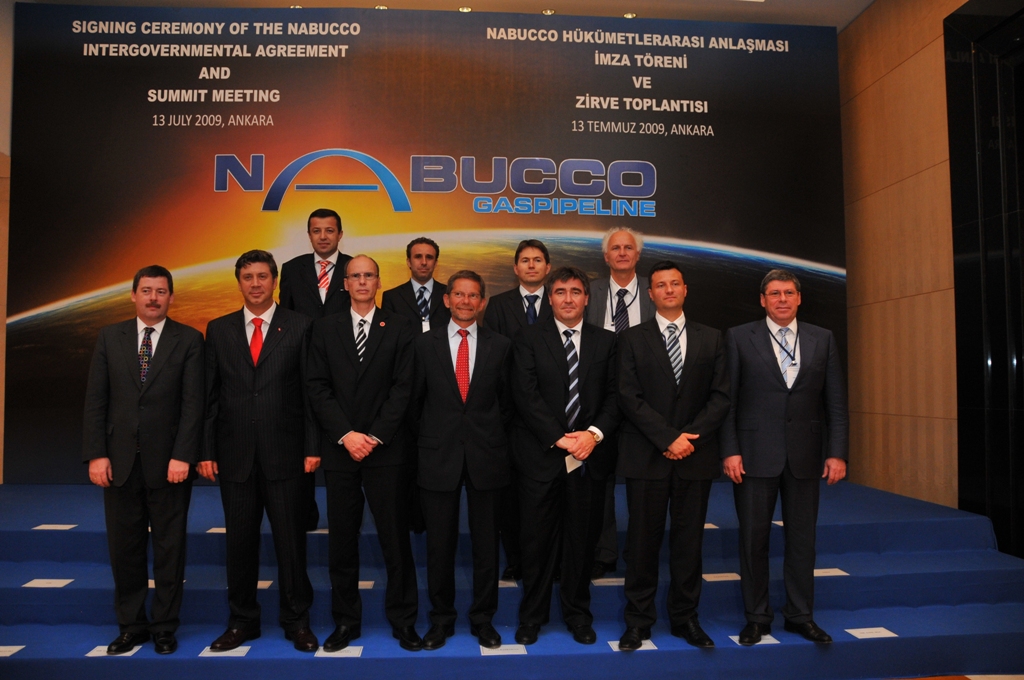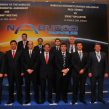
Turkey Signals a Shift on French Participation in Nabucco
Publication: Eurasia Daily Monitor Volume: 7 Issue: 51
By:

The Turkish parliament ratified the Nabucco inter-governmental agreement (IGA) on March 4, which was signed in July 2009 at a highly-publicized ceremony in Ankara (EDM, July 14, 2009). Consequently, all IGA signatories have concluded the ratification process. The Nabucco consortium welcomed this development, claiming that it is the only project among various competing proposals to have secured the transit rights from all relevant countries (www.nabucco-pipeline.com, March 5).
The project will now move to the next stage in the finalization of the legal framework governing the pipeline. In this stage, the Nabucco consortium, which is composed of the energy companies from the five transit countries and the German RWE, will negotiate separate project support agreements with the transit nations. Turkish Energy Minister, Taner Yildiz, had explained earlier that Turkey has already initiated the process toward the signature of the project support agreement and the establishment of a national company. Ankara expects to conclude these procedures soon (Anadolu Ajansi, February 2).
Although the Turkish parliament approved the agreement by a clear majority, representatives of the opposition parties used the parliamentary session to voice their criticism of the government’s energy policies, especially in the context of the government’s claim to have bolstered the country’s role as an energy corridor. They alleged that the government failed to protect Turkish interests in recent deals, including Nabucco. They highlighted, for example, that although the Turkish government previously insisted on several conditions including a preemptive right to buy 15 percent of the gas flowing through Nabucco at discounted prices, it has failed to achieve those objectives. In response, Yildiz defended Ankara’s policies, arguing instead that Turkey obtained a profitable deal in the IGA, as it would receive a larger share of the tax revenues and charge transportation fees (www.cnnturk.com, March 4).
The criticism during the parliamentary discussions raises a broader issue: Turkish efforts to use its critical position in European energy security as a leverage –or trump card– to obtain some political benefits. On this issue, the Turkish government, despite its claims to have accomplished its goal of turning Turkey into a major energy hub, has a mixed track record. On many occasions Ankara tied its leverage in Nabucco to other issues. Its efforts to accelerate the stalled EU accession process through threats of non-cooperation in Nabucco failed to bear any fruit. By contrast, it effectively used its position in Nabucco in other cases.
To boost the credibility of the project in the eyes of potential investors and suppliers, the original consortium, formed by the gas companies from transit countries only, has considered the participation of other major players in the gas industry. In 2007, the transit countries considered the participation of Gaz de France (GDF), which expressed interest in joining. However, Turkey vetoed GDF, because Ankara is imposing an undeclared economic embargo against French business interests due to Paris’s stance on the Armenian “genocide” claims and Turkey’s EU bid. As a result, German RWE became the sixth shareholder of the consortium (EDM, January 23, 2009).
The debate on the participation of the GDF has recently resurfaced, which underscores the consortium members’ concern to reenergize the project through new partnerships. What is interesting in these developments is the evolving position of Ankara. During President Abdullah Gul’s visit to Paris, President Nicolas Sarkozy lobbied for French participation in the project. Although Gul did not comment publicly, this trip provided indications that Turkey might be ready to move away from using punitive economic measures toward Paris, and instead offers positive inducements to foster a closer bilateral relationship (EDM, October 13, 2009).
Ankara, however, did not conceal its willingness to use its position in Nabucco as leverage to change the French position on issues of concern to Turkey. In particular, Turkey has expected France to facilitate Turkish EU accession, by breaking the deadlock on the energy chapter. The Greek Cypriots have been vetoing the opening of this chapter, citing their disputes with Turkey. Turkish Prime Minister, Recep Tayyip Erdogan, has criticized the EU’s position on this issue as discrimination, since Ankara believes that, from a technical point of view, it has fulfilled all the requirements to open the energy chapter. On numerous occasions Turkish officials expressed their desire to see French leaders playing a more active role in convincing the Greek Cypriots to drop this demand, as well as lifting France’s veto on other chapters (Hurriyet Daily News, February 12, March 5).
Thus, Turkey has waited for the French government to take the first step, before lifting its objections toward its participation in Nabucco. In November 2009, in response to Sarkozy’s remarks about French participation in Nabucco, Yildiz argued: “Let me make it crystal clear. Without the opening of the energy chapter, it is not appropriate even to [talk about French participation]. We cannot simply listen to Sarkozy’s statements [to that effect], as though no problems existed [in Turkey’s EU accession process]. We are part of the EU’s efforts to solve its energy problems. Therefore, we cannot accept the fact that the energy chapter is blocked by Greek Cypriots” (Aksam, November 13, 2009).
During French Trade Minister, Anne-Marie Idrac’s, recent visit to Ankara, however, Yildiz told reporters that GDF was interested in participating in the Nabucco consortium. When asked about the earlier disagreements with Paris, Yildiz added that Ankara was open to new offers and opportunities to develop cooperation. Both Yildiz and Idrac vowed to use their partnership in the energy sector to boost bilateral relations. Idrac also expressed French support for the opening of the energy chapter (Anadolu Ajansi, www.trt.net.tr, February 25). Meanwhile, other Nabucco shareholders stated that, though no formal negotiations are currently underway, they would welcome GDF’s participation (Trend Capital, March 2).
It is uncertain if Yildiz’s positive statements on French participation mark a significant change in Turkish policy. Nor is it clear if France will reverse its policy of placing obstacles in the path of Turkey’s membership process. However, how effectively Turkey can use this positive atmosphere with France to remove the Greek Cypriot veto over the energy chapter will be the next major test of the achievements of the Turkish government’s energy diplomacy.




